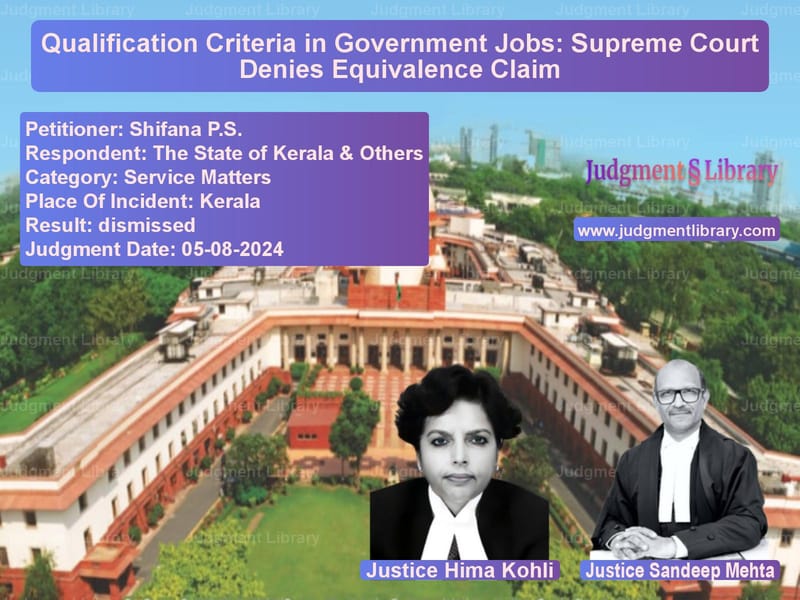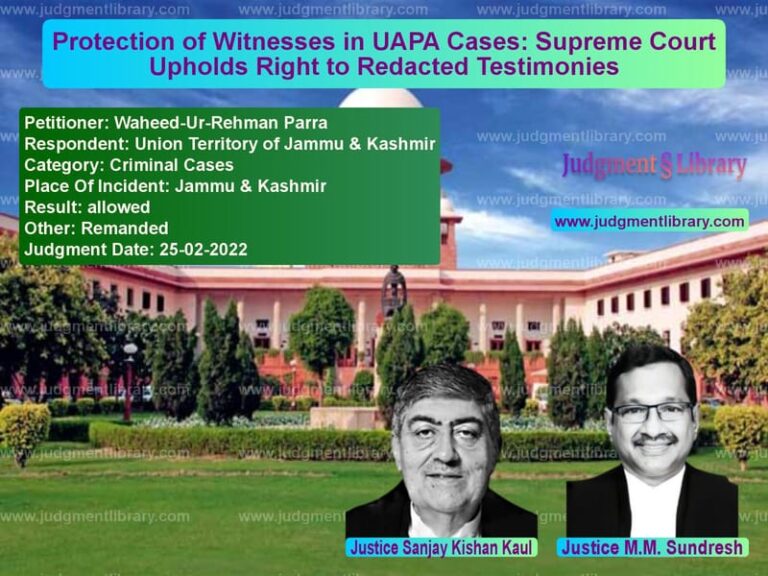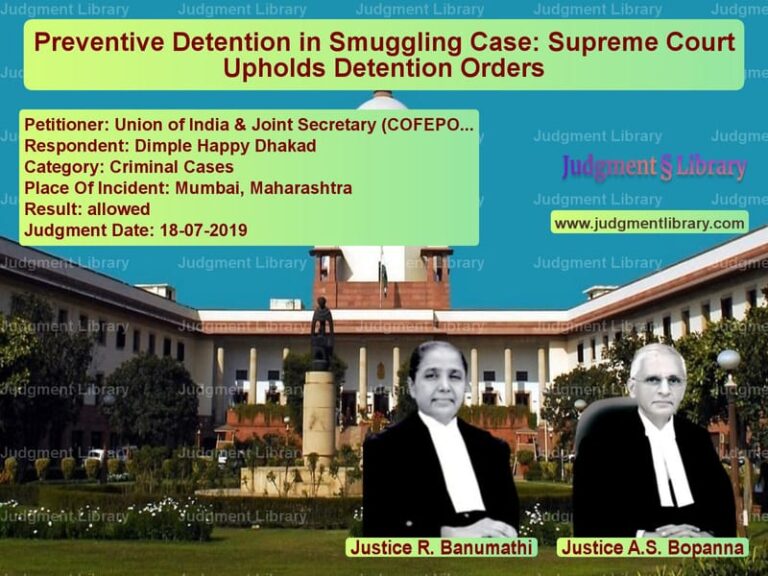Qualification Criteria in Government Jobs: Supreme Court Denies Equivalence Claim
The Supreme Court of India recently ruled on an important case concerning the recognition of academic qualifications in government job recruitment. The case of Shifana P.S. vs. The State of Kerala & Others dealt with whether a degree in B.Sc (Polymer Chemistry) could be treated as equivalent to a B.Sc (Chemistry) degree for the purpose of appointment as a High School Assistant (Physical Science) in Kerala.
This judgment reaffirms the principle that the determination of qualification equivalence is a matter for academic authorities and recruiting bodies, not the courts. The ruling follows established precedents in similar cases, making it clear that judicial review cannot alter prescribed qualification criteria.
Background of the Case
The Kerala Public Service Commission (KPSC) issued a recruitment notification on April 30, 2008, inviting applications for the post of High School Assistant (Physical Science). The eligibility criteria specified that candidates must have:
- A degree in the concerned subject (Physics, Chemistry, or Home Science) and a B.Ed./BT qualification.
- Alternatively, a degree in Geology (Main) with Physics and Chemistry as subsidiary subjects and a B.Ed. (Physical Science) was also acceptable.
Shifana P.S., the appellant, applied for the post, claiming that her B.Sc (Polymer Chemistry) degree, along with a B.Ed. in Physical Science, met the required qualification criteria. She cleared the written examination conducted by KPSC and was invited for an interview. However, KPSC asked her to produce an equivalency certificate proving that her degree was equivalent to a B.Sc (Chemistry) degree.
The appellant presented a certificate from the University of Calicut, which recognized her B.Sc (Polymer Chemistry) degree as equivalent to a B.Sc (Chemistry) degree for employment and higher education purposes. However, KPSC did not accept this equivalency and excluded her from the final merit list.
Legal Proceedings
Aggrieved by KPSC’s decision, the appellant approached the Kerala Administrative Tribunal (KAT), which dismissed her petition. She then moved the Kerala High Court, which upheld KPSC’s decision. The appellant subsequently filed a special leave petition before the Supreme Court of India.
Arguments by the Appellant
The appellant’s counsel argued:
- The Kerala Administrative Tribunal did not reject her case on the grounds of qualification equivalence but rather on the reasoning that she had not studied Physics as a subsidiary subject.
- The University of Calicut had explicitly certified that B.Sc (Polymer Chemistry) was equivalent to B.Sc (Chemistry) for employment and higher studies.
- Since she had cleared the written examination and was called for an interview, she should be included in the final merit list.
- KPSC had acted arbitrarily by disregarding the equivalency certificate issued by a competent educational authority.
Arguments by KPSC
The respondents, represented by KPSC, countered:
- The notification clearly specified a degree in Chemistry, and the appellant did not possess such a degree.
- Under the Kerala State & Subordinate Service Rules, 1958, KPSC did not have the authority to determine the equivalence of qualifications unless explicitly provided by special rules.
- The Supreme Court had previously ruled in A. Suma v. Kerala Public Service Commission that equivalency determinations were outside the scope of judicial review.
- The High Court had rightly upheld the rule that only the government or a designated academic authority could decide qualification equivalency, not KPSC or the courts.
Supreme Court’s Observations
The Supreme Court analyzed past judgments on the issue of qualification equivalence and made the following key observations:
1. Judicial Review Cannot Determine Qualification Equivalence
Referring to the case of Zahoor Ahmad Rather & Others vs. Sheikh Imtiyaz Ahmad & Others, the Court reiterated:
“Judicial review can neither expand the ambit of the prescribed qualifications nor decide the equivalence of the prescribed qualifications with any other given qualification. The determination of equivalence is a matter for the State, as the recruiting authority, to decide.”
2. Only Competent Authorities Can Decide Equivalence
In Unnikrishnan C.V. & Others vs. Union of India & Others, the Supreme Court had held:
“Equivalence is a technical academic matter and cannot be implied or assumed. It must be explicitly recognized by a competent academic authority through specific orders or resolutions.”
3. Certificate Issued by the University of Calicut Was Insufficient
The Supreme Court found that while the University of Calicut had issued an equivalency certificate, there was no official government order or special rule explicitly treating B.Sc (Polymer Chemistry) as equivalent to B.Sc (Chemistry) for government recruitment. Thus, the appellant’s claim could not be upheld.
Final Judgment
The Supreme Court dismissed the appeal, ruling:
- The appellant did not possess the required qualification as specified in the recruitment notification.
- Judicial review could not override or modify the prescribed eligibility criteria.
- Determination of qualification equivalence must be done by the State or the designated academic authority, not the courts.
- The High Court and KPSC had correctly interpreted the rules and recruitment criteria.
As a result, the appellant was deemed ineligible for the post of High School Assistant (Physical Science), and her name was not included in the final merit list.
Implications of the Judgment
This ruling has far-reaching implications for government recruitment and judicial intervention in employment eligibility disputes:
- Reaffirms Authority of Recruiting Agencies: The judgment upholds the role of state authorities and academic institutions in determining qualification equivalency.
- Limits Judicial Overreach: Courts cannot interfere with prescribed eligibility criteria unless there is clear evidence of legal violations.
- Ensures Transparency in Recruitment: Prevents candidates from claiming equivalency without formal recognition from authorized institutions.
- Sets Precedent for Future Cases: The ruling will guide future disputes regarding qualification equivalency in public sector jobs.
The Supreme Court’s decision in Shifana P.S. vs. The State of Kerala serves as a critical precedent, ensuring that recruitment policies remain fair, transparent, and within the purview of competent authorities. The judgment safeguards the integrity of government job eligibility criteria while reinforcing the principle that courts cannot create or modify qualification requirements.
Petitioner Name: Shifana P.S..Respondent Name: The State of Kerala & Others.Judgment By: Justice Hima Kohli, Justice Sandeep Mehta.Place Of Incident: Kerala.Judgment Date: 05-08-2024.
Don’t miss out on the full details! Download the complete judgment in PDF format below and gain valuable insights instantly!
Download Judgment: shifana-p.s.-vs-the-state-of-kerala-supreme-court-of-india-judgment-dated-05-08-2024.pdf
Directly Download Judgment: Directly download this Judgment
See all petitions in Employment Disputes
See all petitions in Recruitment Policies
See all petitions in Public Sector Employees
See all petitions in Judgment by Hima Kohli
See all petitions in Judgment by Sandeep Mehta
See all petitions in dismissed
See all petitions in supreme court of India judgments August 2024
See all petitions in 2024 judgments
See all posts in Service Matters Category
See all allowed petitions in Service Matters Category
See all Dismissed petitions in Service Matters Category
See all partially allowed petitions in Service Matters Category







